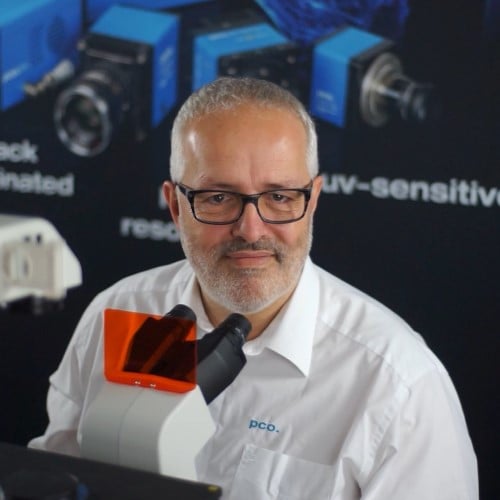About This Webinar
Multiplex imaging, either multicolor fluorescence or multispectral absorption and reflection imaging, is rapidly gaining popularity in the life sciences and medical arenas. Being able to image samples at a variety of wavelengths in live or fixed samples provides a depth of information that was never possible to attain with conventional microscopy. From deeper tissue penetration to enhanced surgical guidance and improved disease detection, multiplex imaging enhances medical diagnostics with noninvasive, detailed, live insights into pathological and physiological states of tissue for better patient outcomes.
This webinar discusses the options and requirements for performing multiplex imaging from the illumination to the detection and the optics in between to navigate the light to and from the sample.

Who should attend:
R&D Scientists, engineers, and manufacturers who are interested in the capabilities of multiplex imaging. Those who are in charge of purchasing cameras, imaging equipment, and optics. Anyone who is interested in learning more about multicolor fluorescence or multispectral absorption and reflection imaging who work with technologies including microscopy, optics, LEDs, and machine vision.
About the presenters:
 Kavita Aswani, Ph.D., serves as the senior applications scientist for biomedical products at Excelitas Technologies. With a doctorate earned from the University of Iowa, she boasts an extensive background, encompassing seven years of scientific research expertise and more than 24 years of applications experience in the fields of microscopy and fluorescence industry. Throughout her career, Aswani has contributed to numerous publications and peer-reviewed journal articles. Her specialized areas of work include widefield illumination microscopy, laser scanning microscopy, and flow cytometry. She remains an engaged member of both the Society for Neuroscience and the Royal Microscopical Society.
Kavita Aswani, Ph.D., serves as the senior applications scientist for biomedical products at Excelitas Technologies. With a doctorate earned from the University of Iowa, she boasts an extensive background, encompassing seven years of scientific research expertise and more than 24 years of applications experience in the fields of microscopy and fluorescence industry. Throughout her career, Aswani has contributed to numerous publications and peer-reviewed journal articles. Her specialized areas of work include widefield illumination microscopy, laser scanning microscopy, and flow cytometry. She remains an engaged member of both the Society for Neuroscience and the Royal Microscopical Society.
 Gerhard Holst, Ph.D., graduated at the Technical University Aachen, Germany, with a degree in electrical engineering in 1991 and went on to complete his doctorate at the University of Dortmund in collaboration with the Max-Planck-Institute for Systems Physiology in Dortmund, Germany, in 1994. Holst furthered his research as a member of the Microsensor Research Group at the Max-Planck-Institute for Marine Microbiology in Bremen, Germany, from 1994 to 2001. From 2001 to 2021 Holst was head of the research and science department at PCO AG, where he was responsible for new technologies, research, and sensor projects, including the development of sCMOS image sensors. Since the acquisition by Excelitas in September 2021, he has become senior imaging product and application scientist and is responsible for some of the advanced sCMOS camera systems, as well as the FD-FLIM and SWIR cameras and research projects.
Gerhard Holst, Ph.D., graduated at the Technical University Aachen, Germany, with a degree in electrical engineering in 1991 and went on to complete his doctorate at the University of Dortmund in collaboration with the Max-Planck-Institute for Systems Physiology in Dortmund, Germany, in 1994. Holst furthered his research as a member of the Microsensor Research Group at the Max-Planck-Institute for Marine Microbiology in Bremen, Germany, from 1994 to 2001. From 2001 to 2021 Holst was head of the research and science department at PCO AG, where he was responsible for new technologies, research, and sensor projects, including the development of sCMOS image sensors. Since the acquisition by Excelitas in September 2021, he has become senior imaging product and application scientist and is responsible for some of the advanced sCMOS camera systems, as well as the FD-FLIM and SWIR cameras and research projects.
About Excelitas Technologies Corp.:
Excelitas is the leading provider of advanced, life-enriching technologies that make a difference, serving global market leaders in the Life Sciences, Advanced Industrial, next-generation Semiconductor, Aerospace and Defense end-markets. Headquartered in Pittsburgh, PA, USA, Excelitas is an essential partner in the design, development, and manufacture of photonic technologies, offering leading-edge innovation in sensing, detection, imaging, optics, and specialty illumination for customers worldwide. Their innovative X-Cite® illuminators are recognized as the industry standard in fluorescence microscopy, offering maximum stability & superior illumination uniformity to optimize imaging and ensure greater data reliability. Their PCO® brand offers cutting-edge sCMOS and high-speed cameras for scientific and industrial research. The PCO scientific series includes both cooled and uncooled sCMOS cameras, with fast image acquisition, low readout noise, and an exceptional dynamic range. Their Optem® Lens Systems deliver precision optical performance throughout the VIS-SWIR spectrum for high-resolution, micro-inspection solutions.